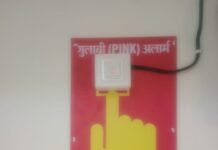
Just after India votes in 2019, it will be the world’s biggest democratic exercise, and the largest ever test of the role of social media in an election.
As the ruling BJP readies for battle with the newly energised Congress-led opposition in 2019 Lok Sabha polls, likely to be held by May, the role of Facebook, Twitter and WhatsApp could be crucial in deciding who wins.
India at present has close to 900 million eligible voters, and an estimated half-a-billion have access to the Internet. The country has 300 million Facebook users and 200 million on Facebook’s WhatsApp messaging service—more than any other democracy. Millions use Twitter.
“Social media and data analytics will be the main actors in the upcoming India elections. Their use would be unprecedented as both parties now use social media,” said Usha M Rodrigues, a communications professor at Deakin University in Melbourne, Australia, whose research has focused on social media and Indian politics.
The potential for abuse is also immense, with incendiary news and videos capable of fanning violence in the sprawling multi-religious and multi-ethnic nation. Fake news and messages circulated on social media have led to more than 30 deaths since last year, data portal IndiaSpend says, mostly rumours about child kidnapping gangs.
Political differences have in the past been no less deadly.
“Social media discourse, already bitter, will turn bilious,” Milan Vaishnav, a senior research fellow at the Carnegie Endowment for International Peace in Washington, said of the coming campaign for the general election. “It will be no-holds barred on social media given that the opposition smells blood and the ruling party has its back against the wall.”
Both the main parties accuse each other of propagating fake news while denying they do so themselves. Nevertheless, the battlelines between them are clearly drawn. Congress has attacked Prime Minister Narendra Modi’s economic policies and his party’s ideology, while the BJP dismisses the Congress as incompetent liberals out of touch with the people.
This month, the Congress won elections in three major states that have been the bastion of the BJP, setting the stage for a tight contest in 2019. Helping the opposition party was a revamped social media strategy.
WAR ROOMS
At the last election in 2014, the Congress was crushed by the techno-savvy Modi and his array of social media weapons, including a flurry of tweets from his personal account, a BJP campaign on Facebook and holographic displays of Modi in remote villages.
Congress chief Rahul Gandhi got a Twitter account only in 2015. But the opposition party is catching up and the playing field has gotten a lot bigger.
India now has 450 million smartphone owners against 155 million at the last election in 2014, according to Counterpoint Research. That’s more than the entire population of the United States, the crucible for election campaigns on social media.
Reuters visited one of the hubs of Congress’s online operations in Rajasthan, one of the three states it won this month—a drab three-bedroom apartment up a dimly lit staircase in the city of Jaipur.
Inside, party workers tracked news channels and social media posts on a wall of television screens. A three-member team of audio, video and graphic experts designed campaign material that was posted to public websites, while other volunteers used WhatsApp to send instructions to party workers.
“We were kids back then, but we are going to outmanoeuvre them now,” said Manish Sood, 45, who runs his own social media marketing business and was managing the Congress volunteers at the Jaipur war room.
Still, fighting Modi online isn’t easy. With 43 million followers on Facebook and 45 million on Twitter globally, he is among the world’s most followed politicians. Rahul still only has 8.1 million followers on Twitter and 2.2 million on Facebook.
A request by Reuters to visit the BJP’s social media centre in Jaipur was declined, but a member of the party’s Rajasthan state IT unit, Mayank Jain, said it ran similar social media operations from two city apartments.
“Congress understands social media a bit now, but they do not have the volunteer manpower,” Jain said in an interview, showing dozens of BJP WhatsApp groups on his phone, one of which was named “BJP RAJASTHAN’S Warriors”.


